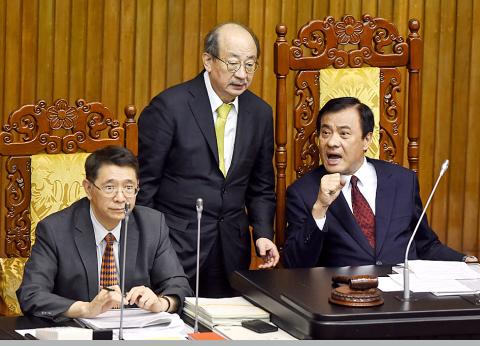Lawmakers yesterday amended the Code of Criminal Procedure (刑事訴訟法) to provide a legal basis for travel restrictions, which were previously enforced on the basis of rules governing limitation of the residence of a person of interest.
The amendment added a chapter titled “restrictions on departures,” which cover departures of a defendant by air or by sea.
The code lacked clear regulations on travel restrictions, which in practice had been imposed as a limitation of the residence of a defendant, said Democratic Progressive Party Legislator Chou Chun-mi (周春米), a sponsor of the amendment.

Photo: Chien Jung-fong, Taipei Times
However, the concept of a limitation of residence does not necessarily justify the judiciary depriving a defendant of their “freedom to change residence,” which is granted by the Constitution, she said.
The amendment is meant to differentiate between limitation of residence and travel restrictions, she added.
With the exception of crimes whose severest punishment is a fine or detention, a prosecutor or a judge may place departure restrictions on a defendant who does not have a fixed residence or lodging, or who is likely to flee the country; conceal, tamper with or destroy evidence; or conspire with others to give false testimonies, the amendment says.
A travel restriction must not last longer than eight months, but may be extended for up to two times, with the first extension no longer than four months and the second no longer than two, it says.
The combined duration of travel restrictions imposed on a defendant whose alleged crime is punishable by a prison term of up to 10 years must not exceed five years, whereas the overall duration for those who have been accused of committing other crimes must not exceed 10 years, it says.
For defendants granted a deferred sentence, parole, non-prosecution or an acquittal, the departure restrictions will no longer apply, but new restrictions can be put in place if the case is subject to an appeal, it says.
A defendant or their attorney may apply to a prosecutor or judge to have a travel restriction revoked or changed, but if a case is being reviewed, the right to change or revoke a travel ban resides with the presiding judge, it says.
The aforementioned rules also apply to people who are on parole, subject to limitation of residence, or are under investigation, but not detained, it says.
A defendant may file an interlocutory appeal against a travel restriction, it says.
Legislators approved another amendment to the code that would grant defendants the right to view, transcribe or photograph court documents and evidence presented against them after gaining the consent of a court.
However, a court may turn down a defendant’s request to exercise the aforementioned right if it believes it would affect the adjudication of another case; would not help with their legal defense in a court; or if the documents or evidence requested are irrelevant to the crimes of which they are accused, the amendment stipulates.
A defendant may appeal a court decision that denies them access to court documents or evidence, it says.

Alain Robert, known as the "French Spider-Man," praised Alex Honnold as exceptionally well-prepared after the US climber completed a free solo ascent of Taipei 101 yesterday. Robert said Honnold's ascent of the 508m-tall skyscraper in just more than one-and-a-half hours without using safety ropes or equipment was a remarkable achievement. "This is my life," he said in an interview conducted in French, adding that he liked the feeling of being "on the edge of danger." The 63-year-old Frenchman climbed Taipei 101 using ropes in December 2004, taking about four hours to reach the top. On a one-to-10 scale of difficulty, Robert said Taipei 101

A preclearance service to facilitate entry for people traveling to select airports in Japan would be available from Thursday next week to Feb. 25 at Taiwan Taoyuan International Airport, Taoyuan International Airport Corp (TIAC) said on Tuesday. The service was first made available to Taiwanese travelers throughout the winter vacation of 2024 and during the Lunar New Year holiday. In addition to flights to the Japanese cities of Hakodate, Asahikawa, Akita, Sendai, Niigata, Okayama, Takamatsu, Kumamoto and Kagoshima, the service would be available to travelers to Kobe and Oita. The service can be accessed by passengers of 15 flight routes operated by

Taiwanese and US defense groups are collaborating to introduce deployable, semi-autonomous manufacturing systems for drones and components in a boost to the nation’s supply chain resilience. Taiwan’s G-Tech Optroelectronics Corp subsidiary GTOC and the US’ Aerkomm Inc on Friday announced an agreement with fellow US-based Firestorm Lab to adopt the latter’s xCell, a technology featuring 3D printers fitted in 6.1m container units. The systems enable aerial platforms and parts to be produced in high volumes from dispersed nodes capable of rapid redeployment, to minimize the risk of enemy strikes and to meet field requirements, they said. Firestorm chief technology officer Ian Muceus said

MORE FALL: An investigation into one of Xi’s key cronies, part of a broader ‘anti-corruption’ drive, indicates that he might have a deep distrust in the military, an expert said China’s latest military purge underscores systemic risks in its shift from collective leadership to sole rule under Chinese President Xi Jinping (習近平), and could disrupt its chain of command and military capabilities, a national security official said yesterday. If decisionmaking within the Chinese Communist Party has become “irrational” under one-man rule, the Taiwan Strait and the regional situation must be approached with extreme caution, given unforeseen risks, they added. The anonymous official made the remarks as China’s Central Military Commission Vice Chairman Zhang Youxia (張又俠) and Joint Staff Department Chief of Staff Liu Zhenli (劉振立) were reportedly being investigated for suspected “serious